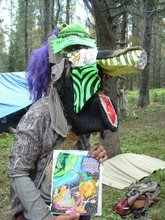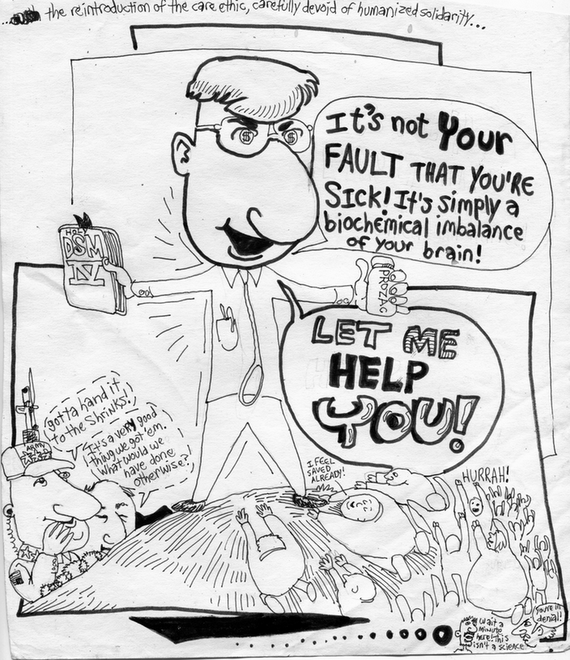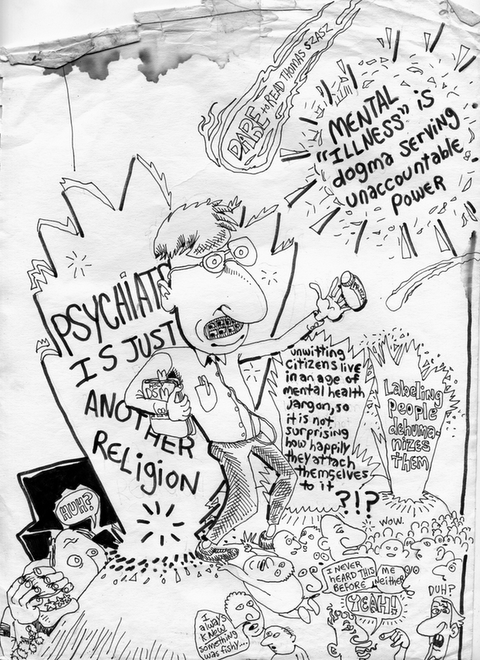Phirst off, i want to say i agree with the angle in which Ron Sakolsky is coming from in his Why Misery Loves Company, i just don't totally buy into the idea of "warrior" that the indigenous are using to perhaps bridge with we whom have been so programmed towards war. The warrior angle may well reach many more than my ideah, but that's okay; i aim to reach a pivotal few.
So i play in a most serious way with a poetic ideah i call "Orrior" (one who sees value in taking on a term for themselves which is not in subordination to the imagination of war, as in "warrior"), from here. (re: in the context of the CruciaL aRtz, not Martial Arts)
My vision wants to mesh with the indigenous traditional ways, yet perhaps go further in a most mutually-beneficial way.
Thus, an ideah i came up with iz to art the miserable, in a way where we glorify their orientation, yet do not aid in further institutionalizing or entrenching it. Rather, we inspire them into going into a processing.
I think of the radical faerie way of making a mountain empress of a particularly bad-ass qween, and art still further. To playfully/lovingly/seriously enshrine the *sacred* spirit of those who, in the context of a system bent upon compelling their powerless feelings, don the fabrics of misery.
Think of scenarios. A symbolic, ceremonial procession and crowning of the MOST miserable. Invitation given, then, to participate in a secret society of arters. Where the Miserable Empress is most seriously allowed to play, and become much more, when they feel like it.
I think i am touching on something, but i haven't completely grasped it. Perhaps our fellow human beings, called indigenous, could add to this? Or perhaps those decolonizing their minds would like to step up and most seriously play? (can you even give yourselves permission??)
The angle is to foment communities of ecstatic imagination. And to depth charge each other, towards inspiring each other to conceive of ourselves as much more than death cult-ure dictates.
article excerpt:
In Mohawk scholar Taiaiake Alfred’s new book, Wasáse (2005), he points to the aforementioned coping as a symptom of colonization. In seeking to get beyond coping and to develop a theory of what he calls "anarcho-indigenism," he asks the question, what prevents us from decolonizing our minds? Interestingly enough from a surrealist perspective, he points to the atrophied power of the imagination as a key impediment to decolonization.
Ah-HAH!
As he explains, "We have lost our ability to dream our new selves and a new world into existence. We have mistakenly accepted the resolution to our problems that is designed by people who would have us move out of our rusty old colonial cages and right back into a shiny new prison of coping defined by managed fears and deadened emotional capacities."
A great quote for the thread i started on so-called "mental illness"!
In the process of liberating the land from the continually grasping claws of the colonial system, he calls for the creation of an "indigenous warrior ethic" based upon emancipating the occupied territory of the mind.
If we aspire to be dream warriors, we must recognize that we have all been colonized by the hegemony of civilization— both settlers and indigenous people, though not in like manner. Though this colonization is experienced differently, and is predicated on unequal access to privilege, civilization has cut deeply into all of our psyches, in effect, threatening to lobotomize our ability to dream. For surrealists, the ultimate revolutionary goal of realizing poetry in everyday life is very much about regenerating the bedrock primal connection between dream and reality that has been eroded by the same miserabilist system of civilization that has stolen the land from beneath indigenous feet. From an anarcho-surrealist perspective, moving toward a world in which we can all lead more poetic lives involves restoring the insurrectionary power of the imagination and unleashing it to create an anarchy that is not afraid to dream.
wOw!



No comments:
Post a Comment